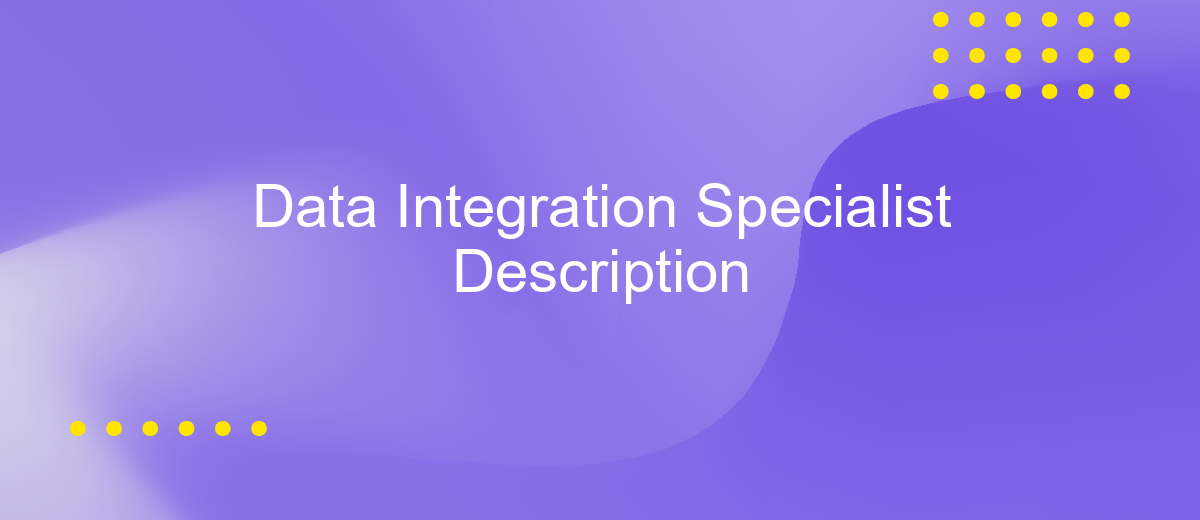Data Integration Specialist Description
A Data Integration Specialist plays a crucial role in modern organizations by ensuring seamless data flow between various systems and platforms. They are responsible for designing, implementing, and managing data integration solutions that enable efficient data sharing and accessibility. This article will delve into the key responsibilities, required skills, and the impact these specialists have on enhancing organizational data management and decision-making processes.
Introduction
The role of a Data Integration Specialist is crucial in the modern data-driven landscape. These professionals are responsible for ensuring seamless integration of data from various sources into a cohesive and accessible system. This role demands a deep understanding of data architecture, data warehousing, and ETL (Extract, Transform, Load) processes. Data Integration Specialists are vital for organizations looking to leverage their data for strategic decision-making and operational efficiency.
- Designing and implementing data integration solutions
- Maintaining data quality and consistency
- Collaborating with data analysts and other stakeholders
- Monitoring and troubleshooting data integration processes
- Ensuring compliance with data governance policies
In summary, a Data Integration Specialist plays a pivotal role in managing and optimizing the flow of data within an organization. Their expertise helps in transforming raw data into valuable insights, enabling businesses to thrive in a competitive environment. By bridging the gap between diverse data sources and business needs, they ensure that data is both reliable and actionable.
Responsibilities

As a Data Integration Specialist, one of your primary responsibilities is to design, develop, and implement data integration solutions to streamline business processes. You will work closely with various teams to understand their data needs and ensure seamless data flow between different systems. Utilizing tools like ApiX-Drive, you will configure and manage integrations, ensuring data accuracy and consistency across platforms.
Additionally, you will monitor and troubleshoot data integration issues, providing timely resolutions to maintain system efficiency. You will also document integration processes and create user guides to support team members in understanding and utilizing the data integration solutions. Staying updated with the latest trends and technologies in data integration will be crucial to continuously improve and optimize the integration processes.
Qualifications

The ideal candidate for the Data Integration Specialist role should possess a robust blend of technical expertise and strong interpersonal skills. This position demands a proactive individual who is adept at managing multiple tasks and can thrive in a fast-paced environment. The successful candidate will demonstrate a keen ability to troubleshoot complex data issues and provide innovative solutions to streamline data processes.
1. Bachelor's degree in Computer Science, Information Technology, or a related field.
2. Minimum of 3 years of experience in data integration or a similar role.
3. Proficiency in SQL, ETL tools, and data warehousing concepts.
4. Experience with cloud platforms such as AWS, Azure, or Google Cloud.
5. Strong understanding of APIs and web services.
6. Excellent problem-solving skills and attention to detail.
7. Effective communication and collaboration abilities.
In addition to the technical requirements, the candidate should exhibit a strong commitment to continuous learning and professional development. The ability to adapt to evolving technologies and methodologies is crucial for success in this role. A passion for data and a drive to improve data integration processes will set the candidate apart.
Education and Training

To become a proficient Data Integration Specialist, a solid educational foundation is crucial. Most employers require candidates to have at least a bachelor's degree in computer science, information technology, or a related field. This academic background provides essential knowledge in data management, software development, and system architecture.
In addition to formal education, practical training and certifications play a significant role in enhancing a specialist's skills. Hands-on experience with data integration tools and platforms, such as Informatica, Talend, or Microsoft SSIS, is highly valued. Furthermore, staying updated with the latest industry trends and technologies is essential for career advancement.
- Bachelor's degree in Computer Science, Information Technology, or a related field
- Certifications in data integration tools (e.g., Informatica, Talend, Microsoft SSIS)
- Practical experience with data integration projects
- Continuous learning through workshops and industry conferences
By combining a robust educational background with practical experience and continuous learning, aspiring Data Integration Specialists can develop the expertise needed to excel in this dynamic field. Employers look for individuals who not only possess technical skills but also demonstrate a commitment to staying current with evolving technologies.
Skills
A Data Integration Specialist must possess a strong proficiency in data management and integration tools. They should be well-versed in SQL, ETL processes, and data warehousing concepts. Familiarity with cloud platforms such as AWS, Azure, or Google Cloud is essential for handling large-scale data operations. Additionally, expertise in scripting languages like Python or JavaScript is crucial for automating data workflows and ensuring seamless data integration.
Experience with integration services like ApiX-Drive can significantly enhance a specialist's ability to streamline data flows between different systems. ApiX-Drive offers a user-friendly interface and robust features for connecting various applications, making it a valuable tool for any Data Integration Specialist. Strong analytical skills, attention to detail, and the ability to troubleshoot complex data issues are also critical. Effective communication and collaboration skills are necessary to work with cross-functional teams and ensure data integrity across the organization.
FAQ
What does a Data Integration Specialist do?
What skills are essential for a Data Integration Specialist?
How does a Data Integration Specialist ensure data quality?
What tools are commonly used for data integration?
Why is data integration important for businesses?
Time is the most valuable resource for business today. Almost half of it is wasted on routine tasks. Your employees are constantly forced to perform monotonous tasks that are difficult to classify as important and specialized. You can leave everything as it is by hiring additional employees, or you can automate most of the business processes using the ApiX-Drive online connector to get rid of unnecessary time and money expenses once and for all. The choice is yours!

